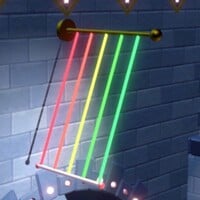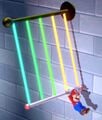Trapeze: Difference between revisions
Nintendo101 (talk | contribs) mNo edit summary |
Nintendo101 (talk | contribs) m (ugh) |
||
| Line 4: | Line 4: | ||
|latest_appearance=''[[Super Mario 3D World + Bowser's Fury]]'' ([[List of games by date#2021|2021]]) | |latest_appearance=''[[Super Mario 3D World + Bowser's Fury]]'' ([[List of games by date#2021|2021]]) | ||
}} | }} | ||
'''Trapezes''', originally known as '''swings''', are platforming objects in the | '''Trapezes''', originally known as '''swings''', are platforming objects in the [[Super Mario (franchise)|''Super Mario'' franchise]] used to swing across [[pit]]s, similarly to [[rope]]s in other ''Super Mario'' games. The player characters grips a trapeze's bar on contact. Flicking the control stick left and right causes the character to swing the trapeze and build momentum. Letting go at the apex propels the character farther than they would have otherwise. | ||
Trapezes are mechanically similar to [[wire|bar]]s and are comparable to the [[Swing (Super Mario Sunshine)|wooden swing]]s in ''[[Super Mario Sunshine]]''. | Trapezes are mechanically similar to [[wire|bar]]s and are comparable to the [[Swing (Super Mario Sunshine)|wooden swing]]s in ''[[Super Mario Sunshine]]''. | ||
Revision as of 20:35, July 7, 2024
| Trapeze | |
|---|---|
 Screenshot from Super Mario 3D World | |
| First appearance | Super Mario Galaxy (2007) |
| Latest appearance | Super Mario 3D World + Bowser's Fury (2021) |
Trapezes, originally known as swings, are platforming objects in the Super Mario franchise used to swing across pits, similarly to ropes in other Super Mario games. The player characters grips a trapeze's bar on contact. Flicking the control stick left and right causes the character to swing the trapeze and build momentum. Letting go at the apex propels the character farther than they would have otherwise.
Trapezes are mechanically similar to bars and are comparable to the wooden swings in Super Mario Sunshine.
History
Super Mario Galaxy
Swings (recognized as "trapezes" in the Prima Games guidebook)[1][2] are introduced in Super Mario Galaxy. They resemble a green bar with flowers at opposite ends, and are suspended by vines. They only appear in galaxies with naturalistic terrain, starting with the Honeyhive Galaxy. The first one is near the player's starting position, suspended a little above ground. Falling from this swing is not detrimental to the player's progress. In "Trouble on the Tower", another trapeze occurs well above the ground and is needed to traverse between platforms. Slipping from this one does not make Mario (or Luigi) lose a life, but it does necessitate climbing the tower again. Another swing appears in the Beach Bowl Galaxy, hanging from a palm tree. Letting go at the highest arc of a swing rewards Mario with a 1-Up Mushroom before falling into the water. In the Gold Leaf Galaxy, a swing tosses Mario into a Sling Star needed to reach distant terrain. Another one suspended well above ground during "Purple Coins in the Woods" is required to reach two Purple Coins.
Swings function similarly to the vine in the Beach Bowl Galaxy, and even more so to the horizontal bars found in the Deep Dark Galaxy.
Super Mario Galaxy 2
Swings return in Super Mario Galaxy 2, retaining their floral design and function. They first appear in the Honeybloom Galaxy, which is on a 2D plane. Swings can be used to cross gaps, reach opposite walls to Wall Jump on, and refill Bee Mario's flight meter. One subsequently appears in the Honeyhop Galaxy, where it is needed to reach the Queen Bee.
In a departure from previous appearances, a swing appears in the lava-themed Melty Monster Galaxy, where letting go at the top of an arc brings Mario to a Launch Star needed for progression. When a Green Comet is in orbit, letting the Launch Star drop Mario awards him with a Green Star.
Super Mario 3D World / Super Mario 3D World + Bowser's Fury
In Super Mario 3D World and its Nintendo Switch port, trapezes are introduced in Tricky Trapeze Theater and later used in Rainbow Run, usually found alongside seesaws in the former or Turning Floors in the latter. Each trapeze consists of a long horizontal white bar hanging from a brass pole by five solid glowing beams. The colors of the beams constantly cycle between colors, creating a rainbow effect. Trapezes can be found in variable lengths. When they are not being used, they sway back and forth on their own at varying speeds.
If a character contacts one of the beams on a trapeze, they grab on to two of them and slide down to the bar, occupying one of the trapeze's four slots based on where they contacted it. They can also jump into the bar directly, which skips this animation. Trapezes' slots allow up to four players to simultaneously be on any one trapeze while being able to independently jump off it. When characters are on a trapeze, a short jingle will loop as the trapeze moves back and forth, and it can randomly change pitch after looping. Players can move in the direction that the trapeze is moving to make it move more in that direction, increasing its speed and momentum. Any player can jump to exit the trapeze, and their character's speed upon doing so corresponds to how fast the trapeze is moving.
Gallery
Model from Super Mario Galaxy
Screenshot from Super Mario 3D World + Bowser's Fury
Additional names
Internal names
| Game | File | Name | Meaning
|
|---|---|---|---|
| Super Mario Galaxy Super Mario Galaxy 2 Super Mario 3D World |
ObjectData/Trapeze.arc - content/ObjectData/Trapeze.szs |
Trapeze | - |
| Super Mario Galaxy Super Mario Galaxy 2 |
StageData/ObjNameTable.arc/ObjNameTable.tbl SystemData/ObjNameTable.arc/ObjNameTable.tbl |
空中ブランコ (Kūchū Buranko) | Trapeze |
Names in other languages
| Language | Name | Meaning | Notes |
|---|---|---|---|
| Japanese | ブランコ[3] Buranko |
Swing | |
| Chinese | 鞦韆★[?] Qiūqiān |
Swing | |
| Dutch | Trapeze★[?] | Trapeze | |
| French | Balançoire[citation needed] | Swing | |
| Trapèze★[?] | Trapeze | ||
| Korean | 그네★[?] Geune |
Swing | |
| Portuguese | Trapézio★[?] | Trapeze | |
| Spanish | Trapecio★[?] | Trapeze |
★ - Compare with Tricky Trapeze Theater.
References
- ^ Black, Fletcher (2007). Super Mario Galaxy: PRIMA Official Game Guide (Collector's Edition). Roseville: Prima Games. ISBN 978-0-7615-5713-5. Page 62.
- ^ Browne, Catherine (2010). Super Mario Galaxy 2: PRIMA Official Game Guide. Roseville: Prima Games. ISBN 978-0-30746-907-6. Page 101, 103, 170, 212, 213.
- ^ Sakai, Kazuya (Ambit), kikai, Akinori Sao, Junko Fukuda, Kunio Takayama, and Ko Nakahara (Shogakukan), editors (2015). 『スーパーマリオブラザーズ百科: 任天堂公式ガイドブック』. Tokyo: Shogakukan (Japanese). Page 137, 171, 233.


